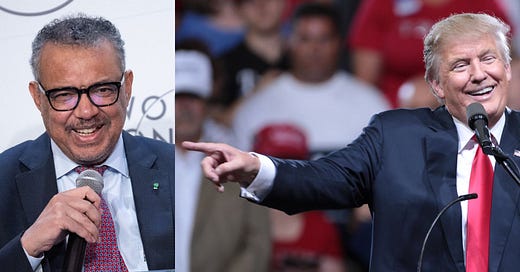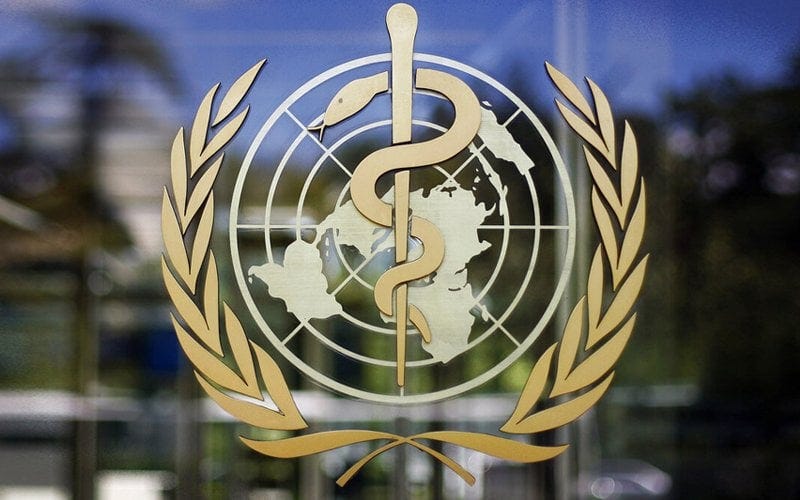Trump's withdrawal from WHO: bold move or empty gesture?
The decision to take the US "out" of the World Health Organization reignites questions about global health governance, national autonomy, and the influence of private interests.
On Monday, Donald Trump, in one of his first acts as President-for-the-Second-Time, issued an executive order withdrawing the United States from the World Health Organization (WHO). While some factions cheered the move as a step toward reclaiming national sovereignty, others recoiled in horror, reigniting fierce debates about the WHO’s role in global health, US autonomy, and the power dynamics of international policymaking.
The question level-headed observers are asking is this: Is the desire to withdraw from the WHO truly a step toward autonomy, or merely a symbolic gesture masking deeper entanglements with corporate and political interests?
The truth lies somewhere in the gray; the decision is far from straightforward — or final. So let’s unpack the implications.
A familiar fight
This isn’t Trump’s first attempt to sever ties with the WHO. In 2020, he initiated a withdrawal, citing the organization’s failures during the COVID-19 pandemic and alleged subservience to China. President Biden reversed that decision in 2021. However, Dr. Meryl Nass reports that Professor Francis Boyle, a Harvard-trained law professor at the University of Illinois, contends Trump’s initial one-year withdrawal notice remains valid. This allows the US to leave without further delay or additional dues, contrary to media claims that another notice period is required.
Yet, instead of issuing a fresh, decisive withdrawal letter which would have been an unequivocal message to all, Trump’s approach was to revoking Biden’s reversal of the original withdrawal, creating procedural ambiguity. Citizen journalist James Roguski is right to point out that a clear-cut communication to the WHO would eliminate confusion and demonstrate unambiguous intent.
The WHO’s power and politics
Far from being a neutral arbiter of global health, the WHO is deeply politicized and heavily influenced by its largest donors, including China and private entities like the Bill and Melinda Gates Foundation. While the US has historically been the WHO’s largest funder, contributing 18% of its budget, China — despite having a population four times larger — contributes significantly less, exploiting its “developing nation” status. Meanwhile, the Gates Foundation wields outsized influence, steering policies toward pharmaceutical solutions that align with its investments.
Dr. Nass raises a critical concern: Will the US withdrawal simply transfer WHO functions to other unaccountable entities like GAVI, Pfizer, or Gates-backed initiatives? Without systemic reform, the risk looms of merely replacing one corrupt middleman with another.
Trump’s executive order shifts oversight of public health and biosecurity to the National Security Council (NSC), framing it as a "security" issue. While not a new concept, this raises alarms among watchdogs, who warn that militarizing public health decisions could lead to even less transparency and accountability.
The cost of leaving
Proponents of withdrawal argue that leaving the WHO will free the US from bureaucratic inefficiencies and financial exploitation. Critics, however, warn that severing ties could jeopardize access to critical global health data, particularly on influenza strains used in vaccine development. Nass counters that much of this data originates from Australia and US-funded research, making the WHO’s role less indispensable than commonly perceived.
Others argue the real risk lies in losing a platform for influence. By exiting the WHO, the US risks ceding leadership to nations like China and private interests. Former CDC Director Dr. Tom Frieden has criticized Trump’s decision, claiming it endangers Americans and the world by increasing the risk of a deadly pandemic. Frieden emphasizes the need for global collaboration, but the critical question remains: Collaboration with whom, and on whose terms?
The executive order directs a “pause” in funding and the recall of US personnel working with the WHO but stops short of outright termination. It also calls for identifying “credible and transparent” partners to assume WHO functions but provides no safeguards against these alternatives falling prey to the same inefficiencies and corruption.
Roguski highlights two glaring omissions: (1) the order does not revoke amendments to the International Health Regulations (IHR) adopted in 2024, leaving the US entangled in obligations that undermine its stated withdrawal intent; and (2) the failure to terminate funding outright leaves room for backsliding.
Without a comprehensive alternative to the WHO, Trump’s move risks being more theater than substantive change. As Nass and Roguski argue, the US may extricate itself from the WHO only to strengthen the grip of private interests like Gates, Pfizer, and GAVI on global health policies.
The decision to withdraw might be framed as a bold stand against global health corruption, but without meaningful reform or robust alternatives, it risks being little more than a symbolic gesture. The question remains: Will this be a turning point for US sovereignty in global health, or just another chapter in the playbook of political theatrics?





In general, leaving the WHO is a good thing but far from enough. The confirmation of RFK Jr as Secretary of HHS is the real key to dismantling the global/U.S. "health care" cabal that has so injured the health of U.S. citizens. Chronic disease is at an all time high especially for children and the attack on our children's health is also tied to the onslaught of vaccines foisted upon them. RFK Jr wishes to reverse that, which of course will hurt Big Pharma and those who benefit from them. That is why so many D.C. insiders are against his confirmation. Case in point, Mike Pence making a special effort to submarine his confirmation through a well organized smear campaign. Pence is no friend of liberty or health for "we the people" which he has made quite clear through his words and actions.
We wouldn't have to worry about another pandemic if we shut down the facilities that play with viruses.
The risk for another "accident " is too obvious.